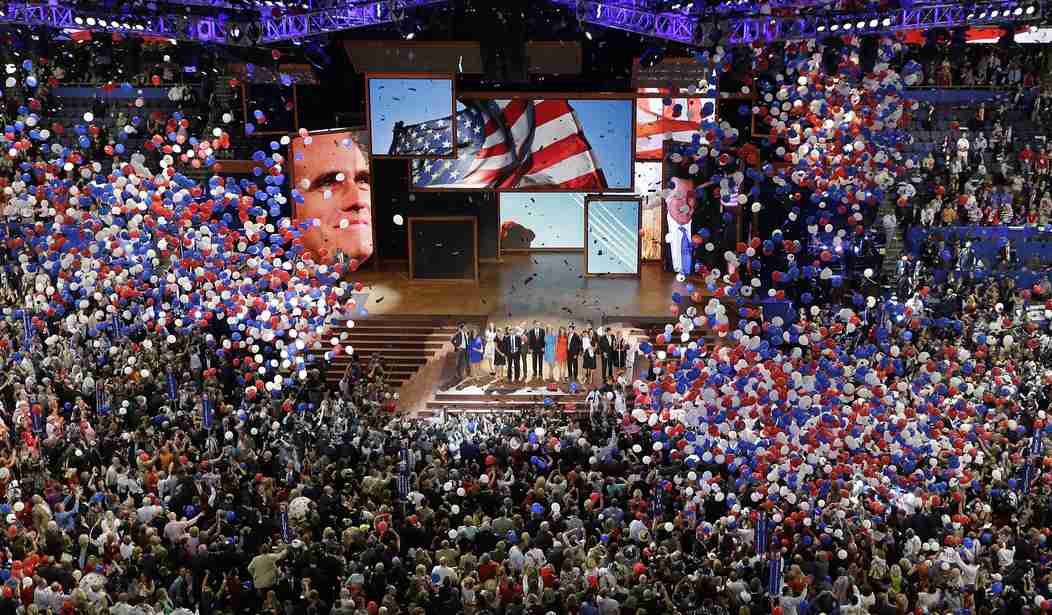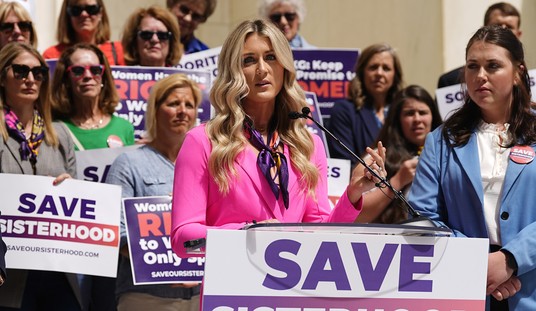I think that at least once every presidential election cycle we get a “brokered convention” boomlet. Back in February 2012, the political press was wetting itself over the probability that no nominee would win enough delegates in the primaries to clinch the nomination (here | here | here). Sounds pretty silly now, doesn’t it? Rather like lunacy, in fact. This year, because of the Trump candidacy and the size of the GOP field, brokered convention has been the flavor du jour of political observers since this summer. Now there is an element of conspiracy. A few noisy Mitt Romney candibots. And we are off to the races.
Back in November, the Washington Post reported that the GOP establishment was so spooked by the specter of a Trump or Carson candidacy that they were trying to develop a strategy that would select Mitt freakin Romney as the GOP candidate:
According to other Republicans, some in the party establishment are so desperate to change the dynamic that they are talking anew about drafting Romney — despite his insistence that he will not run again. Friends have mapped out a strategy for a late entry to pick up delegates and vie for the nomination in a convention fight, according to the Republicans who were briefed on the talks, though Romney has shown no indication of reviving his interest.
For months, the GOP professional class assumed Trump and Carson would fizzle with time. Voters would get serious, the thinking went, after seeing the outsiders share a stage with more experienced politicians at the first debate. Or when summer turned to fall, kids went back to school and parents had time to assess the candidates. Or after the second, third or fourth debates, certainly.
None of that happened, of course, leaving establishment figures disoriented. Consider Thomas H. Kean Sr., a former New Jersey governor who for most of his 80 years has been a pillar of his party. His phone is ringing daily, bringing a stream of exasperation and confusion from fellow GOP power brokers.
There are a lot of reasons why this can’t work. Filing deadlines for ballot access in primaries start closing in late November. Each filing deadline missed requires a write-in campaign in that state. A write-in campaign requires a lot of motivated supporters. We don’t have President Romney because Mitt Romney, for his many virtues, is not a charismatic guy.
First, lets dispel one aspect. Only a small group of monomaniacal Romney supporters ever thought he was going to enter the 2016 race. Their relative prominence in GOP political circles gave the story credence and forced Romney to announce he was not in the race. Again.
On Thursday, the Washington Post started the buzz again: GOP preparing for contested convention.
Republican officials and leading figures in the party’s establishment are preparing for the possibility of a brokered convention as businessman Donald Trump continues to sit atop the polls in the GOP presidential race.
More than 20 of them convened Monday near the Capitol for a dinner held by Republican National Committee Chairman Reince Priebus, and the prospect of Trump nearing next year’s nominating convention in Cleveland with a significant number of delegates dominated the discussion, according to five people familiar with the meeting.
Weighing in on that scenario as Priebus and Senate Majority Leader [mc_name name=’Sen. Mitch McConnell (R-KY)’ chamber=’senate’ mcid=’M000355′ ] (R-Ky.) listened, several longtime Republican power brokers argued that if the controversial billionaire storms through the primaries, the party’s establishment must lay the groundwork for a floor fight in which the GOP’s mainstream wing could coalesce around an alternative, the people said.
The development represents a major shift for veteran Republican strategists, who until this month had spoken of a brokered convention only in the most hypothetical terms — and had tried to encourage a drama-free nomination by limiting debates and setting an earlier convention date.
Now, those same leaders see a floor fight as a real possibility. And so does Trump, who said in an interview last week that he, too, is preparing.
But near the end, McConnell and Priebus acknowledged to the group that a deadlocked convention is something the party should prepare for, both institutionally within the RNC and politically at all levels in the coming months.
The atmospherics of this meeting are horrible. Everyone knows how a brokered convention works and this meeting gives the air of a conspiracy being hatched by the establishment to install their own guy and essentially make the primary process a sham. After Mississippi and the [mc_name name=’Sen. Thad Cochran (R-MS)’ chamber=’senate’ mcid=’C000567′ ]e scandal, I certainly don’t put this outside the realm of possibility. Ominously, the only candidates who was represented at the meeting were Jeb Bush and [mc_name name=’Sen. Marco Rubio (R-FL)’ chamber=’senate’ mcid=’R000595′ ]. Who else was there:
Stuart Stevens, a former adviser to Mitt Romney, said the need to plan for a brokered convention is not necessarily all about Trump.
“Beyond Trump, what you’re seeing is the party bracing for a potential ‘Hunger Games’ scenario where you have a different person win each of the first four primaries and they all have the resources to slug it out until the convention,” Stevens said. “It’s smart to think of contingencies, and if you actually spend time with the numbers, it’s possible someone won’t quickly get the number they need to be the nominee.”
The Hill provides more detail:
“I have broad disagreement with Donald Trump. If he is our nominee, I think he loses, I think Republicans lose the Senate, he puts the House at risk and sends the party into the wilderness for the next decade,” said [mc_name name=’Rep. David Jolly (R-FL)’ chamber=’house’ mcid=’J000296′ ] (R-Fla.), a Jeb Bush backer who this week called for Trump to quit the race.
“If there is a mechanism to make sure somebody other than Donald Trump wins the nomination, I think that is a good thing for Republicans.”
Fellow Florida Republican and Bush supporter, [mc_name name=’Rep. Carlos Curbelo (R-FL)’ chamber=’house’ mcid=’C001107′ ], agreed: “I wouldn’t support Donald Trump for president if he were our nominee. I would support any reasonable idea to find a better nominee.”
Other Republicans were more diplomatic — though their message was roughly the same.
Rep. Steve Chabot (Ohio) said the thousands upon thousands of fervent Trump supporters should be “respected” and heard in the nominating process. But Chabot, a committee chairman who’s close to leadership, warned that the party needed to exhaust every opportunity to ensure Republicans defeat Democratic front-runner Hillary Clinton on Election Day.
“So whatever it is that makes that more likely to happen, I’m for it. I don’t know if it’s a brokered convention or not,” Chabot told The Hill. “But it would be unrealistic for us not to at least have that in the back of our minds that that is a distinct possibility this time.”
Anyone who backs Jeb Bush has forfeited his right to opine on what it takes to win.
Yesterday, Ben Carson was spot on when he talked about leaving the GOP if there is a brokered convention.
Ben Carson is threatening to leave the GOP following a report that senior Republican officials met to discuss the party’s strategy in the event of a brokered convention.
“If the leaders of the Republican Party want to destroy the party, they should continue to hold meetings like the one described in the Washington Post this morning,” Carson said in a statement released by his campaign.
“If this was the beginning of a plan to subvert the will of the voters and replace it with the will of the political elite, I assure you Donald Trump will not be the only one leaving the party,” he continued.
Five unnamed sources told the Post that Republican National Committee (RNC) Chairman Reince Priebus and Senate Majority Leader [mc_name name=’Sen. Mitch McConnell (R-KY)’ chamber=’senate’ mcid=’M000355′ ] (R-Ky.) attended a dinner on Monday with around 20 senior party officials to discuss the party’s convention strategy.
The sources said several longtime party members argued the establishment must lay the groundwork for a floor fight in the event that Donald Trump sweeps through the primaries.
Likewise, [mc_name name=’Sen. Rand Paul (R-KY)’ chamber=’senate’ mcid=’P000603′ ] has expressed the same feelings:
[mc_name name=’Sen. Rand Paul (R-KY)’ chamber=’senate’ mcid=’P000603′ ] said on Friday that, if the Republican establishment tries to block an outsider candidate from winning the party’s nomination through a brokered convention, “there’ll be war within the party and they’ll destroy the party.”
Boston radio host Jeff Kuhner asked Paul what he thought of a Washington Poststory that reported key figures within the Republican party are preparing for a contested convention in which, the story said, “the GOP’s mainstream wing could coalesce around an alternative” to Donald Trump, who continues to lead primary polls.
Paul, who is polling toward the bottom of the Republican presidential field, expressed strong opposition to the plan.
“If the establishment tries to block an outsider from winning the nomination, there’ll be war within the party and they’ll destroy the party,” he said. “The establishment needs to realize that Republicans across the country are unhappy, they’re unhappy with the Washington leaders who are not exercising the power of the purse. They’re unhappy with Washington leaders not standing up to president Obama. And they’re sick and tired of all of it.”
“So if they see their will thwarted through the primary process, I think you’re gonna find that, uh, there’ll be a war declared,” Paul continued. “But it’ll be a war that the establishment has decided to declare on the grassroots and it’s gonna be a real problem.”
If Trump does go into the convention leading in delegates and does not emerge as the nominee then the GOP will be looking at an electoral rout. His supporters will rightfully feel robbed and I could not fault them for that. Likewise, the GOP establishment plan seems to be focused on ensuring that none of the primary candidates are able to get a first round win with the idea that they could trot out Mitt Romney or Bob Dole or someone like that as a candidate.
The notion of a dramatic, eleventh-hour bid for the nomination by Romney has been floated in the political press several times over the past year, often prompting eye-rolls and sarcastic jokes on Twitter. There are plenty of reasons to question the plan’s viability. The likelihood of a contested convention remains low, and even if it happens, Romney could resist the draft efforts. What’s more, current convention rules dictate that a candidate needs a majority of delegates in each of eight different states to be considered for the nomination — something Mormon support alone is unlikely to provide. And, of course, there’s the fact that Romney has already lost a general election once, and has reportedly acknowledged that he would have a difficult time beating Clinton.
But Romney loyalists say all bets will be off if the first ballot vote at next year’s convention fails to produce a nominee, arguing their candidate’s sense of duty will ultimately win out.
It is difficult to imagine the rank and file GOP voters, particularly conservatives, showing up to vote for someone who was not a primary candidate.
What if Trump and Rubio and Cruz and Bush and Christie and so on each win seven states? Or, at least, what if they have delegate majorities from seven states, whether or not they won them? There’s no one eligible to be nominated. Or what if Trump and Rubio have the same number of delegates, but only Trump has majorities in eight states?
This is unlikely, and the party could change the rules, as needed. More likely — albeit not a whole lot more likely — is that three or four candidates split the delegates on the floor of the convention, and campaigns spend hours cajoling and browbeating and promising and praying in the hopes of getting 50 percent-plus-one in order to head to the general election. In that case, the convention transforms from an anointment to . . . an election.
What happens in the general election, once the Republicans have nominated someone that would probably be considered invalid by a large part of the rest of the party, is a speculative, not-gonna-happen question for another day.
The overwhelming odds, though, is that this is simply the high-struck masturbatory impulse that strikes when you combine political reporters anxious for something different and an establishment that is horrified that no one listens to them anymore. And, if they are serious, there is no reason to believe they will be any more competent at this than they are at anything else they undertake. Th verye fact that they are even contemplating such a scheme indicates that they are not worthy of consideration and are as much an enemy of the GOP electorate as the Democrats.

![FILE - In this Aug. 30, 2012, file photo, Republican presidential nominee Mitt Romney and vice presidential nominee [mc_name name='Rep. Paul Ryan (R-WI)' chamber='house' mcid='R000570' ] are joined on the stage by their families at the end of the Republican National Convention in Tampa, Fla. Representatives for news organizations who plan to cover the 2016 convention are protesting a move by the Republican National Committee to charge news media organizations a $150 access fee for seats on the press stand. (AP Photo/Patrick Semansky, File)](https://redstate.com/uploads/2015/12/ap-gop-convention-2012.jpg)












Join the conversation as a VIP Member